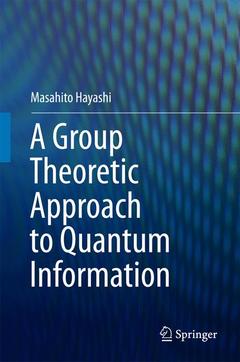A Group Theoretic Approach to Quantum Information, 1st ed. 2017

Masahito Hayashi was born in Japan in 1971. He received the B.S. degree from the Faculty of Sciences in Kyoto University, Japan, in 1994 and the M.S. and Ph.D. degrees in Mathematics from Kyoto University, Japan, in 1996 and 1999, respectively.
He worked in Kyoto University as a Research Fellow of the Japan Society of the Promotion of Science (JSPS) from 1998 to 2000, and worked in the Laboratory for Mathematical Neuroscience, Brain Science Institute, RIKEN from 2000 to 2003, and worked in ERATO Quantum Computation and Information Project, Japan Science and Technology Agency (JST) as the Research Head from 2000 to 2006. He also worked in the Superrobust Computation Project Information Science and Technology Strategic Core (21st Century COE by MEXT) Graduate School of Information Science and Technology, The University of Tokyo as Adjunct Associate Professor from 2004 to 2007. He worked in the Graduate School of Information Sciences, Tohoku University as Associate Professor from2007 to 2012. In 2012, he joined the Graduate School of Mathematics, Nagoya University as Professor. He also worked in Centre for Quantum Technologies, National University of Singapore as Visiting Research Associate Professor from 2009 to 2012 and as Visiting Research Professor from 2012 to now. In 2011, he received the Information Theory Society Paper Award (2011) for Information-Spectrum Approach to Second-Order Coding Rate in Channel Coding. In 2016, he received the Japan Academy Medal from the Japan Academy and the JSPS Prize from Japan Society for the Promotion of Science.
He is a member of the Editorial Board of the International Journal of Quantum Information and International Journal On Advances in Security. His research interests include classical and quantum information theory, information-theoretic security, and classical and quantum statistical inference.
Date de parution : 11-2016
Ouvrage de 228 p.
15.5x23.5 cm
Date de parution : 06-2018
Ouvrage de 228 p.
15.5x23.5 cm
Thème d’A Group Theoretic Approach to Quantum Information :
Mots-clés :
Application of Schur Duality; Asymptotic Setting of Quantum Information; Group Symmetry for Quantum Information; Mutually Unbiased Bases; Optimal Quantum Operation; Quantum Entanglement; Quantum Error Correction; Quantum Error Correction; Quantum State Cloning; Quantum Universal Coding; SIC-POVM; Weyl-Heisenberg Groups



